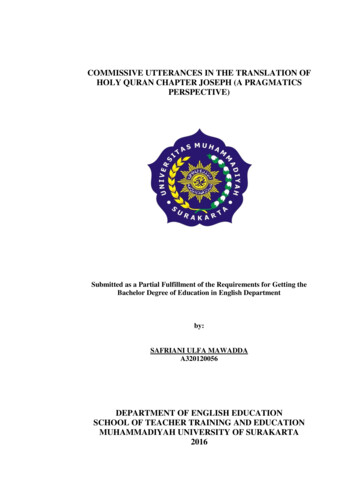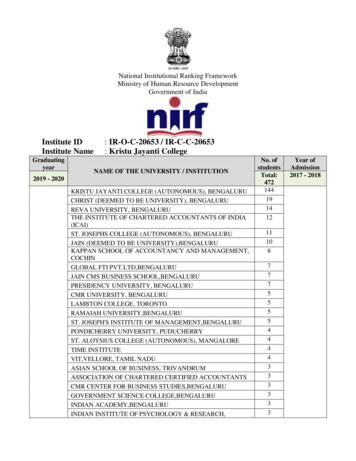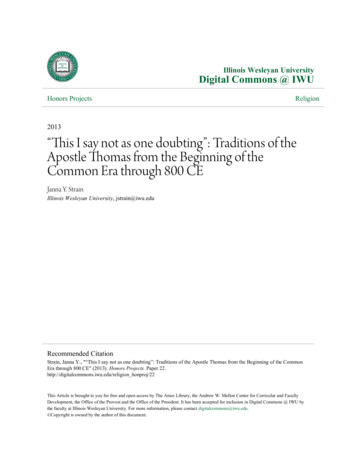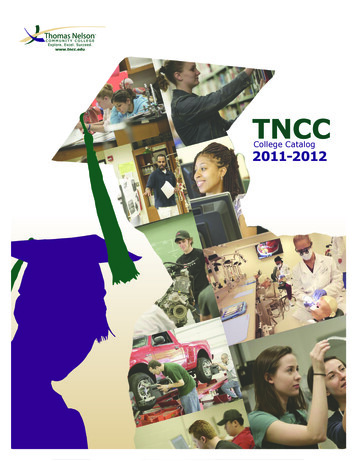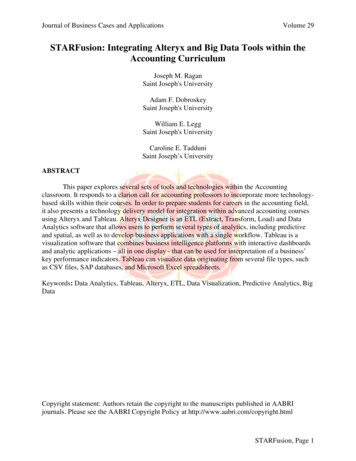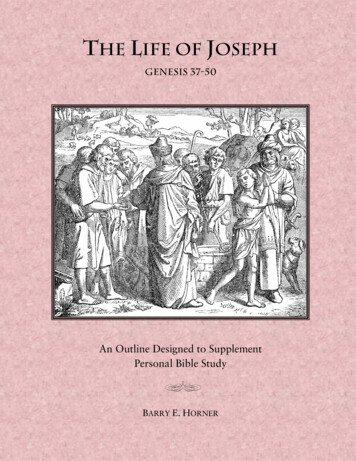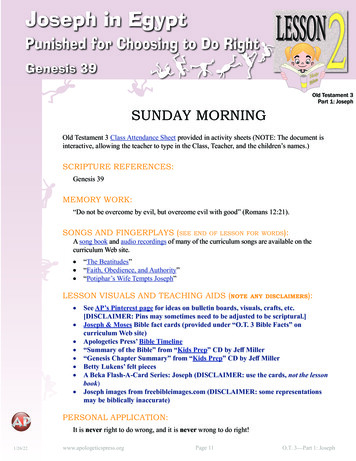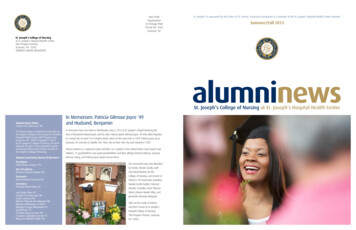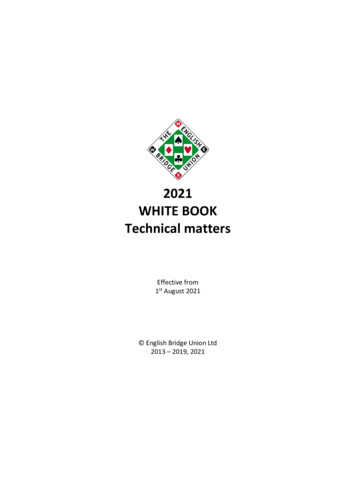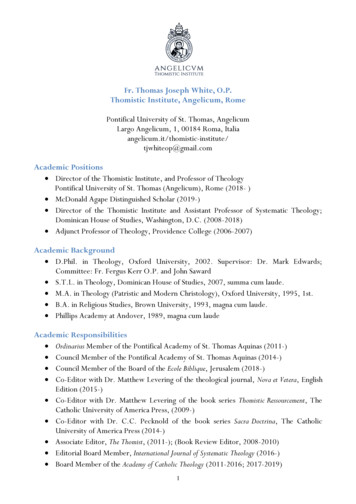
Transcription
Fr. Thomas Joseph White, O.P.Thomistic Institute, Angelicum, RomePontifical University of St. Thomas, AngelicumLargo Angelicum, 1, 00184 Roma, mail.comAcademic Positions Director of the Thomistic Institute, and Professor of TheologyPontifical University of St. Thomas (Angelicum), Rome (2018- ) McDonald Agape Distinguished Scholar (2019-) Director of the Thomistic Institute and Assistant Professor of Systematic Theology;Dominican House of Studies, Washington, D.C. (2008-2018) Adjunct Professor of Theology, Providence College (2006-2007)Academic Background D.Phil. in Theology, Oxford University, 2002. Supervisor: Dr. Mark Edwards;Committee: Fr. Fergus Kerr O.P. and John Saward S.T.L. in Theology, Dominican House of Studies, 2007, summa cum laude. M.A. in Theology (Patristic and Modern Christology), Oxford University, 1995, 1st. B.A. in Religious Studies, Brown University, 1993, magna cum laude. Phillips Academy at Andover, 1989, magna cum laudeAcademic Responsibilities Ordinarius Member of the Pontifical Academy of St. Thomas Aquinas (2011-) Council Member of the Pontifical Academy of St. Thomas Aquinas (2014-) Council Member of the Board of the Ecole Biblique, Jerusalem (2018-) Co-Editor with Dr. Matthew Levering of the theological journal, Nova et Vetera, EnglishEdition (2015-) Co-Editor with Dr. Matthew Levering of the book series Thomistic Ressourcement, TheCatholic University of America Press, (2009-) Co-Editor with Dr. C.C. Pecknold of the book series Sacra Doctrina, The CatholicUniversity of America Press (2014-) Associate Editor, The Thomist, (2011-); (Book Review Editor, 2008-2010) Editorial Board Member, International Journal of Systematic Theology (2016-) Board Member of the Academy of Catholic Theology (2011-2016; 2017-2019)1
http://academyofcatholictheology.org/Ecclesial Background Order of Preachers (Dominicans), solemn profession, May 17, 2007 Diaconal ordination, September 15, 2007 Priestly ordination, May 23, 2008. Member of Provincial Council, Dominican Province of St. Joseph (2010-2014) Member of Provincial Intellectual Life Commission, Province of St. Joseph (2014-18)Areas of expertise, interest and researchModern systematic theology, Thomistic metaphysics, Aquinas’ theology, ChristologyLanguagesFluent in English and French; Proficient in Italian and Latin; Reading knowledge of Spanish andGermanPublications:Authored Books Wisdom in the Face of Modernity: A Study in Thomistic Natural Theology, (First edition:Naples, FL: Sapientia Press, 2009); Second expanded edition: (Naples, FL: SapientiaPress, 2016). The Incarnate Lord: A Study in Thomistic Christology (Washington, D.C.: The CatholicUniversity of America Press, 2015.2016 Catholic Press Association Book Award, first place in the category of theology.2019 Translation into French, Lethielleux Press, Paris. Exodus. A Theological Commentary (Grand Rapids, MI: Brazos Press, 2016). The Light of Christ: An Introduction to Catholicism (Washington, D.C.: The CatholicUniversity of America Press, 2017).2017 Charles Cardinal Journet Prize from the Aquinas Center for Theological Renewal.Translation into Polish in process. The Trinity: On the Nature and Mystery of the One God in process. The Rational Mystery: On the Credibility of Christianity.Edited Books Divine Impassibility and the Mystery of Human Suffering (Grand Rapids: Eerdmans Press,2009), co-edited with Dr. Jim Keating. The Analogy of Being: Invention of the Anti-Christ, or Wisdom of God? (Grand Rapids,Eerdmans Press, 2010). Forward by Archbishop Augustine DiNoia, O.P., Secretary forthe Congregation for Divine Worship. Aquinas and Barth: An Unofficial Ecumenical Dialogue (Grand Rapids: Eerdmans Press,2013), co-edited with Bruce L. McCormack. Thomism and Predestination: Principles and Disputations (Naples, FL: Sapientia Press, 2016),co-edited with Steve Long and Roger Nutt.2
Dogma and Ecumenism: Vatican II and Karl Barth's Ad Limina Apostolorum (Washington,D.C.: Catholic University of American Press (in process for 2019), co-edited withMatthew Levering and Bruce L. McCormack. Cambridge Companion to Aquinas, second edition, with Eleonore Stump, (in process).Scholarly Articles Published Under Review “The Voluntary Action of the Earthly Christ and Necessity of the Beatific Vision,” TheThomist, 69, (October 2005): 497-534. “Balthasar and Journet on the Universal Possibility of Salvation,” Nova et Vetera, EnglishEdition,Vol. 4, No. 3 (2006): 633–666. “Jesus’ Cry on the Cross and His Beatific Vision,” Nova et Vetera, English Edition,Vol. 5,No. 3 (2007): 555–582. “On the Universal Possibility of Salvation,” Pro Ecclesia, Vol. XVII (2008): 269-280. “Dyotheletism and the Consciousness of Christ,” Pro Ecclesia, Vol. XVII, (2008): 396422. “The Precarity of Wisdom: Modern Dominican Theology, Perspectivalism and theTasks of Reconstruction,” Listening Journal of Religion and Culture, Vol. 43, No. 3 (2008):167-85. “Intra-Divine Obedience in Karl Barth and Nicene-Chalcedonian Christology,” Nova etVetera, English Edition,Vol. 6, No. 2 (2008): 377–402. “How Barth Got Aquinas Wrong: A Reply to Archie J. Spencer on Causality andChristocentrism,” Nova et Vetera, English Edition, Vol. 7, No. 1 (2009): 241–70. “The Pure Nature of Christology: Human Nature and Gaudium et Spes 22,” Nova et Vetera,English Edition, Vol. 8, No. 2 (2010): 283-322. “The Priesthood Makes the Church: Ecclesial Communion and the Power of the Keys,”Nova et Vetera, English Edition, Vol. 9, No. 1 (2011): 209-36. “Classical Christology after Schleiermacher and Barth: A Thomist Perspective,” ProEcclesia vol. XX (2011): 229-263. “On Christian Philosophy and Divine Obedience: A Response to Keith L. Johnson,” ProEcclesia, vol. XX (2011): 283-89. “Kenoticism and the Divinity of Christ Crucified,” The Thomist, 75 (2011): 1-41. “Toward a Post-Secular, Post-Conciliar Thomistic Philosophy: Wisdom in the Face ofModernity and the Challenge of Contemporary Natural Theology” Nova et Vetera, EnglishEdition, Vol. 10, no. 2 (2012): 521-30. “Engaging the Thomistic Tradition and Contemporary Culture Simultaneously: AResponse to Burrell, Healy and Schindler” Nova et Vetera, English Edition, Vol. 10, no. 2(2012): 605-623. “Good Extrinsicism: Matthias Scheeben and the Ideal Paradigm of Nature-GraceOrthodoxy,” Nova et Vetera, English Ed. Vol. 11, no. 2 (2013): 537-63. “The Virgin Mary and the Church: The Marian Exemplarity of Ecclesial Faith,” Nova etVetera, Vol. 11, no. 2 (2013): 375-406. “Thomism after Vatican II,” Nova et Vetera, English Edition, Vol. 12, no. 4 (2014):1045-61.3
“Imperfect Happiness and the Final End of Man: Thomas Aquinas and the Paradigm ofNature-Grace Orthodoxy,” The Thomist, 78, 2, April, 2014: 247-89. “The Universal Mediation of Christ and Non-Christian Religions,” Nova et Vetera Vol.14, no. 1 (2016): 177-98. “Divine Simplicity and the Holy Trinity,” International Journal of Systematic Theology, Vol.18, no. 1 (2016): 66-93. “The Right to Religious Freedom: Thomistic Principles of Nature and Grace,” Nova etVetera, Vol. 13, no. 4 (2015): 1149-85. “Nicene Orthodoxy and Trinitarian Simplicity,” American Catholic Philosophical Quarterly90 (4):727-750 (2016). “The Infused Science of Christ,” Nova et Vetera, Vol. 16, no. 2 (2018): 617-41. “The Analogy of Faith in Catholic Theology,” International Journal of Systematic Theology(forthcoming).Scholarly Articles in Edited Volumes “The Precarity of Wisdom: Modern Dominican Theology, Perspectivalism and theTasks of Reconstruction,” forthcoming in a Ressourcement Thomism: Sacred Doctrine, theSacraments and the Moral Life, edited by Matthew Levering, and Reinhard Hütter(Washington, D.C.: The Catholic University of America Press, 2009), pp. 92-122. “Introduction: Divine Impassibility in Contemporary Theology,” with Dr. James F.Keating, in Divine Impassibility and the Mystery of Human Suffering, edited by James F.Keating and Thomas Joseph White, O.P. (Grand Rapids: Eerdmans, 2009), pp. 1-26. “Introduction: The Analogia Entis Controversy and its Contemporary Significance,” inThe Analogy of Being: Invention of the Anti-Christ, or Wisdom of God?, edited by ThomasJoseph White, O.P., Eerdmans Press (forthcoming, 2010). “Through Him All Things Were Made” (John 1:3). The Analogy of the Word Incarnateaccording to St. Thomas Aquinas and its Ontological Presuppositions,” in The Analogy ofBeing: Invention of the Anti-Christ, or Wisdom of God?, edited by Thomas Joseph White,O.P., Eerdmans Press, 2010), pp. 246-79. “The Enduring Significance of the Dominican Doctrine of Grace: The Case ofObediential Potency,” in Dominicans and the Challenge of Thomism ("Biblioteka InstytutuTomistycznego - Teksty i Studia" 3), Warszawa: Instytut Tomistyczny, 2011. “Monotheistic Rationality and Divine Names: Why Aquinas’ Analogy TheoryTranscends both Theoretical Agnosticism and Conceptual Anthropomorphism,” in God,edited by Anselm Ramelow, O.P., Philosophia Verlag, Basic Philosophical ConceptsSeries, 2014. “Sacraments and Philosophy,” in The Oxford Handbook of Sacramental Theology, edited byHans Boersma and Matthew Levering (Oxford: Oxford University Press, 2015). “The Reception of Gaudium et Spes in the 21st Century: The Church in the (Post-)Modern World,” in The Reception of Vatican II in the 21st Century (Oxford: OxfordUniversity Press, 2016), edited by Matthew Lamb and Matthew Levering. “Catholic Predestination,” in Thomism and Predestination: Principles and Disputations,(Naples, FL: Sapientia Press, 2016), co-edited by Steve Long, Roger Nutt and ThomasJoseph White.4
“Creation as Inclusive Hierarchy,” in Dio creatore e la creazione come casa commune;Prospettive Tomiste; Doctor Communis, ed. by S. T. Bonino and G. Mazzotta (Rome:Urbaniana University Press, 2017): 177-99. “The Holy Spirit,” in The Oxford Handbook of Catholic Theology, edited by Lewis Ayres andMedi Volpe, (Oxford University Press, 2019). “Aquinas and Nietzsche on Truth,” forthcoming in a collection in from CatholicUniversity of America Press, edited by Fran O’Rourke. Three other such essays for collective volumes are currently in process.Book reviews Extended book review of the ecumenical writings of Charles Morerod, O.P.: Ecumenismand Philosophy, and Tradition et Unité des Chrétiens: Le Dogme Comme Condition de Possibilitéde l’œcuménisme in Nova et Vetera, English Edition: Vol. 6, No. 2 (2008): 473-81. Preambula Fidei Thomism and the God of the Philosophers, Ralph McInerny, (Washington,D.C.: The Catholic University of America Press, 2007), The Thomist, Vol. 71, No. 4:633-37. Les Anges et Les Démons. Quatorze leçons de théologie, Serge-Thomas Bonino, O.P. (Paris:Parole et Silence, 2007), The Thomist. The Natural Desire to See God According to St. Thomas Aquinas and His Interpreters, LawrenceFeingold (Naples, FL: Sapientia Press, 2010), The Thomist. Introduction to Scholastic Theology, Ulrich G. Leinsle (Washington, D.C.: The CatholicUniversity of America Press, 2010), First Things (May/June, 2011). Known by Nature. Thomas Aquinas on Natural Knowledge of God, Anna Bonta Moreland(New York: Crossroad, 2011), Journal of Religion, vol. 92, n. 1, Jan. 2012: 145-47. Analogia Entis. On the Analogy of Being, Metaphysics and the Act of Faith, Steve A. Long(Notre Dame, IN: Notre Dame University Press, 2011), Review of Metaphysics 66(1):156-158 (2012). Revelation as Testimony: A Philosophical-Theological Study, Mats Walberg (Grand Rapids,MI: Eerdmans Press, 2014), First Things (Nov. 2015).Representative Journal Essays “Why Should Christians Study Philosophy?,” First Things (Aug./Sept, 2011). “The Priest as Instrument of Christ,” Nova et Vetera, Vol. 9, no. 2 (2011). “Love’s Greater Freedom,” First Things (June/July, 2012). “The Tridentine Genius of Vatican II,” First Things (Nov. 2012). “Sociology as Theology,” First Things (June/July, 2013). “Aquinas on the Wisdom of the Cross,” Nova et Vetera, English Edition, Vol. 12, no. 4(2014): 1029-43. “Catholicism in an Age of Discontent,” First Things (Nov. 2016). “The Metaphysics of Democracy,” First Things, Feb. 2017.5
Representative Academic PresentationsIn virtue of the work of the Thomistic Institute I have given approximately 10-20 academicpresentations a year for the past 10 years. These are across a range from quite academicallyspecialized to more introductory. Below are representative examples of a more academicimport. Several others can be found in recorded form at:https://soundcloud.com/thomisticinstitute October 31, 2008, “Chalcedonian Christology after Schleiermacher and Barth: BetweenHistory and Dogma, A Thomistic Perspective.” Guest lecture at Duke Divinity School,Durham, N.C. November 17, 2009, “The Divinity of Christ Crucified according to St. ThomasAquinas,” Conference, “Thomism and the Renewal of Contemporary Theology,”Pontifical Faculty of the Immaculate Conception, Washington, D.C. April 23, 2010: Invited Seminar Lectures on Nature and Grace in the DominicanTradition, Fribourg University, Switzerland. July 2, 1010: “The Theology of Grace in a Secular Age: Impossible or Inescapable?,” at“Dominicans and the Challenge of Thomism,” Thomistic Institute, Warsaw, Poland,June 30-July 4, 2010. Dec. 3, 2010: “True and False Religion and the Common Good: The Role of Caritas Deiin Caritas in Veritate,” at the John Paul II Institute for Marriage and Family Studies,Washington D.C. Feb. 5, 2011: “Aquinas's Imperfect Happiness and the Ideal Paradigm of Nature-GraceOrthodoxy,” Ave Maria University, Conference on Philosophical Education inTheology, in honor of Ralph McInerny. Feb. 16, 2011: “Redeemable Suffering? St. Thomas Aquinas on the Meaning of HumanSuffering and the Passion of Christ,” Merton Lecture Series, Columbia UniversityChaplaincy, at the Columbia Law School. May 25, 2011: “The Virgin Mary and the Church: The Marian Exemplarity of EcclesialFaith,” Academy of Catholic Theology, Washington, D.C. June 20, 2011: “Aquinas and Barth on the Communication of Idioms”, PrincetonTheological Seminary, Conference: Aquinas-Barth: An Unofficial Ecumenical Dialogue. June 25, 2011: “Judaic-Christian Reason and the Divine Names of God,” St. Mary’sCollege, Newburgh, N.Y., at the conference: Thomas Aquinas and ContemporaryPhilosophy. Feb. 16, 2012, “Monotheistic Rationality and Divine Names: Why Aquinas’s AnalogyTheory Transcends both Theoretical Agnosticism and Conceptual Anthropomorphism.”Blackfriars Hall, Oxford University Feb. 26-27, 2013: Lectures on Aquinas’ Philosophy and Theology, Lumen ChristiInstitute, University of Chicago. March 12, 2013, “"Exodus 3:14: The Metaphysics of the Divine Name: A Theologicaland Biblical Discussion,” The Catholic University of America. April 20, 2013: “Sacraments and the Virtues of Religion,” Conference on the Virtues ofReligion, Providence College. July 1, 2013: “Thomism after Vatican II,” at “Dominicans and the Renewal ofThomism,” International Conference on Thomism, PFIC, Washington, D.C.6
March 30, 2014, “Aquinas on Imperfect Happiness and the Final End of Man,” DSPT,Berkeley, CA. Jan. 27, 2015, “Divine Simplicity and the Holy Trinity,” Annual Aquinas Lecture,Blackfriars, Oxford University. Feb. 2, 2015, Annual Aquinas Lecture, Priory Institute, Dublin, Ireland July 31, 2015, Lectures in Divine Simplicity, Templeton Seminar, University of St.Thomas, St. Paul, MN Dec. 3, 2015, Duke Divinity School: Lecture and Discussion on Aquinas on theIncarnation Dec. 15-20, Presentation at John Templeton Foundation grant “Virtue, happiness, andthe Meaning of Life,” organized by Candace Vogler and Jennifer Frey, Columbia, SouthCarolina. March 2016: “Aquinas on the Incarnation,” Harvard University. June 2016: 6th Annual Newburgh Aquinas Philosophy Workshop, “Thomistic Principlesfor thinking about the Right to Religious Freedom.” June, 2016: Chicago, Illinois, Presentation on “Aquinas and Nietzsche on Truth,” JohnTempleton Foundation grant “Virtue, happiness, and the Meaning of Life.” June, 2016: “Aquinas and Nietzsche on Truth.” Paris, France, Irish College, “Aquinasand Modern Philosophers” Conference organized by Fran O’Rourke, on July, 2016 “Infused Science of Christ,” at Third International Conference on ThomisticPhilosophy at Universidad Santo Tomás, Chile, July 19-21 of 2016. July 26, 2016: “Infused Science of Christ,” at a workshop at the Dominican School ofTheology, Buenos Aires, Argentina. Sept. 10, 2016: “Happiness without Religion?,” New York University Catholic Center. Oct., 2016, “Reasonable Redemption? Aquinas on the Ethics of the Atonement,” BrownUniversity. Nov., 2016, “Aquinas and Nietzsche on Christianity and Happiness,” Yale University. March 2017, “What is Beauty? Aquinas on the Nature of Beauty,” MassachusettsInstitute of Technology. December, 2017, “After-Christ: Understanding Nietzsche’s Post-Modern Critique ofChristianity,” Harvard University. Dec. 11, 2018, “Ecclesiology and Sacrament of Confession in Thomistic Perspective,” atthe Thomas Institut, Utrecht, Netherlands. Sept. 13-14, 2019, presentation at conference on “New Trinitarian Ontologies,”Cambridge University.Organization and Direction of Academic EventsIn my capacity as Director of the Thomistic Institutes in Washington D.C. and subsequently inRome, I have organized approximately 300 academic events (conferences or lectures) in thepast 10 years. Thomistic Circles events at the Dominican House of Studies, 2009-2018. Thomistic Circles events at the Catholic Center, New York University, 2012-2018.7
Co-founder with Fr. Dominic Legge, O.P. of the Campus Chapters of the ThomisticInstitute, (2015-) https://thomisticinstitute.org/campus-chapters/ Organizer of Annual “Aquinas Philosophy Workshop,” Mount St. Mary’s College,Newburgh, NY, 2009-2018.http://www.msmc.edu/News/inaugural philosophy workshop at mount saint mary .be Director of events at the Thomistic Insittute at the Angelicum in Rome, stic-events/Representative Interviews n-person-naturallyreligious/ /catholicism-in-the-modernworld omas-joseph-white-o-p/8
B.A. in Religious Studies, Brown University, 1993, magna cum laude. Phillips Academy at Andover, 1989, magna cum laude Academic Responsibilities Ordinarius Member of the Pontifical Academy of St. Thomas Aquinas (2011-) Council Member of the Pontifical Academy of St. Thomas Aquinas (2014-)

